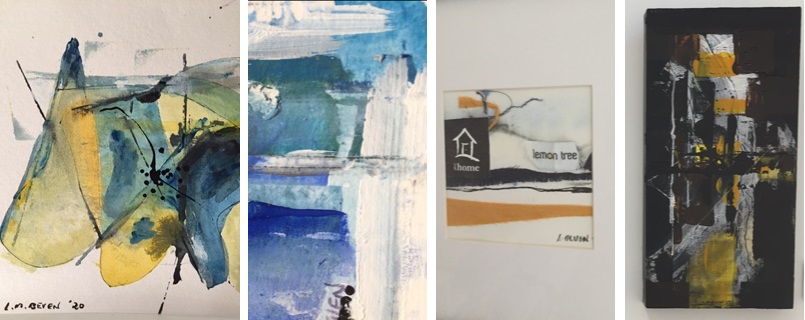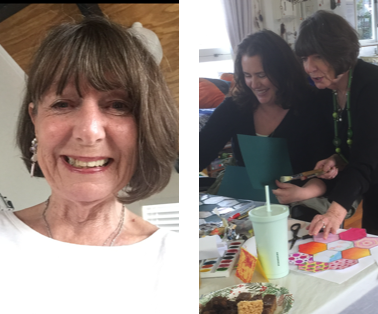
A journey of lifelong learning and the power of art
Te Kunenga ki Pūrehuroa Massey University alumna Lorraine M. Beven’s journey from legal secretary to clinical arts therapist is a tale of grit and boundless creativity, a life that embodies a dedication to lifelong learning.
“It is never too late to commence university study or change career trajectories,” Lorraine says.
A nurturing ground
Lorraine’s early years were painted with curiosity, creativity, and a nurturing familial environment that fostered her love for literature and arts. Her childhood, rich with singing, drama, and competitive dancing, set the stage for a lifelong pursuit of personal growth and creativity. Her high school experience included having her written work featured in school publications. Even though she began a career in law after finishing high school, her artistic spirit thrived.
After completing her high school education, Lorraine set foot in the legal profession and swiftly rose to serve as a secretary to a Queen's Counsel, who later became a High Court Judge. While this phase ushered her into the formal, professional sphere, her creativity continued to simmer beneath the surface.
Awakening academic aspirations
Lorraine’s life took a significant turn when she became a single mother of five in her late thirties. It was then that she re-entered the legal profession, studying law part-time while working. “Life’s vicissitudes are my strongest motivator,” she recalls. Her determination led her to acquire a Legal Executive Diploma from the New Zealand Law Society in two years.
“Since then, my proclivity to study was ignited.”
The official inauguration of Massey’s Auckland campus in 1993 captivated Lorraine. At the age of 40, she delved into a new academic journey, enrolling in Massey’s Certificate in Social Work programme. This decision was a leap into the unknown; a learning landscape unfolded before her, including psychology, sociology, social work, counselling and anthropology studies.
Upon completing this certificate, she transferred these credits to pursue a Bachelor of Arts in Business Psychology. This degree included business modules covering management, organisational psychology, and career development. The range of her experiences during these studies would later prove instrumental in shaping her career as an arts therapist.
Venturing into this educational journey was a daunting yet thrilling experience. “Graduating at 43, I never regretted the decision to pursue university education as a mature student,” Lorraine shares.
Art as self-care: a revelation
After graduating, Lorraine began her professional journey at Massey. However, a harsh reality struck two years after she transitioned from Massey's Albany to its Wellington campus as a student liaison and recruitment advisor when her mother was diagnosed with terminal cancer. As an only child, it was evident that she would shoulder the responsibility of becoming the primary caregiver. Even with her psychology degree and a wealth of experience in health-related issues, the emotional burden was immense. During this challenging phase, she sought comfort in the world of art.
Influenced by psychologist Carl Jung’s insight that intense pain often leads individuals to seek a safe space to express their feelings, thereby opening up a stream of creative possibilities, Lorraine found tranquillity and solace in painting.
“It may seem incongruous that I turned to art at this time, beginning to paint, something I had not done since high school, that a paintbrush and a pot of paint could provide me and my mother with a sense of calm and some relief for mum from her pain, as well as add a sense of ordinariness to our days was profound. What I didn’t realise then was that this was art as therapy, playing a significant role in my self-care and well-being during that difficult time,” she reveals.
After her mother's passing, Lorraine moved back to Auckland to be amongst family and friends. She embarked on a new professional journey with a training organisation. Interestingly, the artwork she created during her mother's illness, which journeyed back home with her, later served as an integral part of her master's thesis – a retrospective autoethnographic contextualisation of her experience as a caregiver inclusive of the concepts of anticipated grief, compassion fatigue and art-making as a self-care tool in response to the inner turmoil and vulnerability that can accompany the role of caregiver.
However, a mere four years into this new chapter, Lorraine faced a health crisis of her own – a diagnosis of a pancreatic tumour. Following a successful operation and several months of recovery, she felt an intense desire to pivot her career direction. Lorraine aspired for a profession where her age, along with her accumulated academic and life experiences, could be leveraged to guide people in using creativity for emotional resilience and self-care. With this vision, at the age of 60, she pursued a Master of Arts programme in arts therapy at Whitecliffe College of Arts and Design.
Intense introspection, experiential exercises, and comprehensive study of various arts therapy modalities marked the period at Whitecliffe. “Graduating at 63 as a clinical arts therapist with first-class honours was a proud day for me and my five children,” she reminisces.

The canvas of contribution
Upon graduation, Lorraine was offered the position of arts therapist at an intermediate school. She was deeply inspired by how adolescents expressed their feelings through poetry and art-making, which she found to be a powerful tool for boosting their self-esteem, resilience, and empowerment.
Simultaneously, Lorraine has engaged in community art projects. She has been instrumental in fostering community spirit through art, such as workshops and group sessions that reflect collective identities and shared histories. She believes that public art enhances the physical environment and boosts community well-being.
“Art-making is another way of communicating private worlds, allowing people to bring their meaning to it, especially in troubled times, and it can be part of a healing process,” Lorraine says.
“Caring for my mother and other family members grappling with crises over the past ten years has been life-changing for me. It has underscored the power of creativity as a coping mechanism in all its diverse forms. Art, journaling and poetry have become my life raft during these turbulent times. ”
Today, Lorraine continues to champion the therapeutic role of arts in healthcare and mental health. In her North Shore, Auckland practice, she promotes expressive arts and lifelong learning. “Full retirement is not on my agenda yet,” Lorraine says, volunteering her time as an arts therapist at a new arts studio called Raft in her local district.